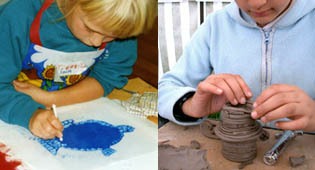











facing the future
Artificial lives
Some people feel that when you do things on a computer you are entering into an unreal world, and are suspicious of its influence on our lives.
There are no physical restrictions on what can be done in games -
They argue that this fantasy, this lack of reality is insidiously detrimental to people’s perceptions as their experiences do not result in real life consequences. This is especially relevant to children since gaming is such a time consuming activity, this limits their time for actual real life experiences of the touchable, physical world.
Physical outputs
This nature of artificiality is actually becoming less significant as more and more uses of digital technology have physical outcomes -
Computer aided design has the added advantage of including programming to pick up any structural faults which don't meet ‘real’ three-
But practical experiences of handling materials are still important factors in design and innovation as an essential part of the creative process. This was extensively stressed more than 35 years ago by M W Thring & Laithwaite (of Imperial College and Queen Mary College London) in their book "How to Invent" (publ. 1977). They even have a chapter entitled 'Thinking with the Hands’.
who is this > M W Thring
Craftwork
One type of experience that is particularly difficult on a computer is any form of artistic craftwork. The process of using materials to create things which look and feel nice, especially things which have natural variation as a result of the materials used, or which have individuality as a result of hand making processes.
In their article on ‘Pop-
"Craft activities have a cognitive dimension -
And beyond all this, there are social [aspects] of craft objects that seem, in some slightly mysterious way, hard to attain in the realm of pure software. Craft objects can be gifts, kept as souvenirs, put on display, grouped into personal collections, cherished and re-
resource link > Susan Hendrix: Pop-
Live counter-
The happy paradox is that, as an antidote to the artificial nature of computer screen interaction, there is a growing re-
The distinction between what is on screen and what is directly experienced will be a big factor in future cultural life.
what do we mean -
• there is special knowledge and understanding to be gained by making things
• childhood plays a vital part in this innovative process
a historical perspective
• observation, trial and error
• origins of maths
• patterns and geometry
facing the future
growing concerns
• Neil MacGregor
• Sherry Turkle
• Seymour Papert